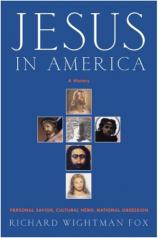Jesus in America: Personal Savior, Cultural Hero, National Obsession
Review
Jesus in America: Personal Savior, Cultural Hero, National Obsession
Straight to the point --- I really like this book, and for a lot of reasons. But I think I actually fell in love with it halfway through page 304, where Richard Wightman Fox quotes from a 1910 hymnal I had never heard of before: Manly Songs for Christian Men. How can you not love a book that opens your world to such a wonderful tidbit as that?
In fact, JESUS IN AMERICA is loaded with wonderful tidbits, and that may be a problem for some readers. It's hard to get a sense of unity out of all this. That didn't particularly bother me --- I can do without a full view of the forest as long as the trees are interesting --- but anyone who approaches this book with the expectation of getting a clear, overall perspective on the ever-evolving roles Jesus has played in the life of America, ever since the very first Christian landed on its shores, is likely to be disappointed.
Fox sees Jesus as the quintessential symbol of American society, but hardly a symbol that means the same thing to each person. "In all likelihood, Jesus is permanently layered into the American cultural soil. Yet his identity is elastic. There is no single Jesus, in America or anywhere else," he writes. What many American Christians --- and non-Christians --- may be surprised to learn is that so much of what we attribute to our contemporary view of Jesus actually has its roots in Puritan and colonial America. The Puritans, of course, saw the settling of the New World as a significant part of God's plan of redemption for humanity, but it was the renowned colonial preacher Jonathan Edwards who applied the "born-again" imagery to the mission of Christians in the colonies. America, he believed, utterly exemplified spiritual rebirth.
Readers may also be surprised to discover how often throughout U.S. history Jesus has been adopted as something of a mascot by partisans all along the political spectrum. The "Jesus is on our side" mentality, as it turns out, isn't just a conservative mentality; liberals have been equally guilty of claiming him to be among their celebrity supporters.
According to Fox, as early as the 1830s, Alexis de Tocqueville observed that Christianity was what kept the self-absorbed individuals of America together as a nation. As Fox writes, "Jesus is a transferable loyalty: people move around the social arena and take him along. People use him for psychological cushioning when they feel anxious or alone. They offer him as proof of respectability when they need a job, a spouse, or a reputation. And they sometimes take him as a personal moral challenge to give more to others and take less for themselves."
And here's a parting tidbit: The first feature-length film depicting the life of Christ, the violent and disturbing From the Manger to the Cross, was released in 1912, much to the dismay of one movie reviewer who considered the crucifixion scene "almost too ghastly in its strict realism." Lo and behold, Mel Gibson seems to have had an equally scorned predecessor.
Bottom line here is that with regard to wordsmithing and research, Fox does an excellent job; with regard to structure, not so much. But JESUS IN AMERICA is still worth reading. If nothing else, you may learn a new song to teach to your manly choir.
-
Reviewed by Marcia Ford on November 13, 2011
Jesus in America: Personal Savior, Cultural Hero, National Obsession
- Publication Date: February 10, 2012
- Genres: Christian
- Hardcover: 496 pages
- Publisher: HarperOne
- ISBN-10: 0060628731
- ISBN-13: 9780060628734





